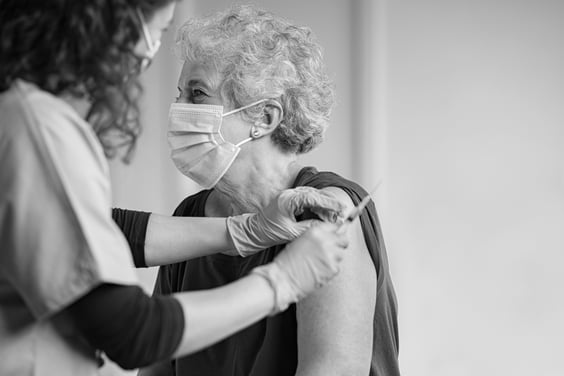In December, the CDC prioritized skilled nursing and assisted living residents and staff members in phase 1a of vaccine rollouts. Now, across the nation, long-term care operators are hosting vaccination clinics for their residents and staff. There are two COVID-19 vaccines currently approved for use in the U.S., with multiple others showing promise in Phase 3 clinical trials. All of this comes as good news. Despite it, Ruth Katz, senior vice president of policy at LeadingAge, warns that as of January 3, 2021, about 50% of nursing home workers were declining to be vaccinated against COVID-19.

In response, operators are implementing a variety of strategies to encourage and improve vaccine acceptance. It should be noted that vaccination clinics continue to ramp up and the CDC reports, as of January 19, that more than 1.7 million doses have been administered across long-term care, representing over 56 percent of the 3 million seniors in skilled nursing facilities, assisted living communities, and other congregate settings.
Leading by Example
To alleviate fears of vaccine side effects, leaders in the long-term care segment are publicizing their own vaccinations. Cindy Baier, President and CEO of Brentwood, Tennessee based Brookdale Senior Living, was among the first in the nation to receive the vaccine. Alongside residents and associates, Baier was one of the first to demonstrate her leadership through example. Similarly, John Moore, Chairman and CEO of Louisville, Kentucky based Atria Senior Living spearheaded what he called the ‘Sleeve Up Atria’ campaign, which urges all staff and residents to get the vaccine as soon as it’s available. By making public their own vaccinations, Cindy Baier, John Moore, and others led through example.
Disseminating Educational Resources
Vigorous education campaigns have also been among the tools used by different types of long-term care operators to increase staff participation in receiving the COVID-19 vaccine. Operators are posting ‘Myth vs. Reality’ posters throughout communities. Educating staff about the safety and benefits of the vaccine and giving them the opportunity to ask questions can alleviate staff concerns. These educational opportunities often have a snowball effect as well and can help persuade others to get vaccinated and add peer pressure to those who are anxious.
Incentives Encourage Immunization
Birmingham, Alabama based Atlas Senior Living is incentivizing staff with up to five paid days off for getting vaccinated. Atlas’ approach focuses on the ‘carrot’ rather than a ‘stick.’ Scott Goldberg, Atlas co-chief executive, said Atlas sought to “avoid villainizing people that didn’t want to take it,” opting instead to focus on education and the reward of paid time off.
Riverdale, New York based Riverspring Health is focusing on small incentives in addition to education and peer encouragement. All staff who receive their vaccine receive a lottery ticket and an entry to win a $50 gift card. Susan Whery, Chief of Geriatrics at the University of New England College of Osteopathic Medicine, suggests that these small “thank you” gifts can be as effective as large bonuses. But the real key to success she says is to “make it the norm to take the vaccine.”
Mandating Compliance
Bloomfield, New Jersey based Juniper Communities has also been engaged in a staff educational campaign showing that the COVID-19 vaccine is both safe and effective. More recently, they have implemented a policy of mandatory vaccinations for all staff, just as is with the case with the seasonal flu shot. CEO Lynne Katzmann says “Our job is to protect people so they can be as healthy as possible…and vaccines are the ultimate form of protection.” In addition to Juniper Communities, Atria Senior Living has also announced that its workers must get both doses of the COVID-19 vaccine by May 1, 2021.
Labor challenges – staffing shortages, turnover, and high staff stress – already challenge the long-term care sector. Some fear that mandating vaccine compliance could worsen employee relations that are already under strain. Katzmann indicates that implementing their peer support program and educational campaigns before imposing the vaccine requirement, has kept staff resignations to a minimum.
Convincing staff to take the vaccine has proven to be challenging, but for the health and well-being of America’s elders, these long-term care operators must persist. As Kim Elliott, senior vice president of Clinical Services, Brookdale Senior Living says, long-term care operators need to “create a culture of vaccine acceptance.”
Be sure to join the
NIC Community Connector and attend the upcoming
NCC Meetup on February 4, 2021 to hear Lori Alford, COO of Avanti Senior Living, discuss the rollout of vaccinations in Avanti’s seven senior living communities and the challenges as well as the wins Avanti has experienced in the first month of the vaccination rollouts.
About Ryan Brooks
Senior Principal Ryan Brooks works with the research team in providing research, analysis, and contributions in the areas of healthcare collaboration and partnerships, telemedicine implementation, EHR optimization, and value-based care transition. Prior to joining NIC, he served as Clinical Administrator for multiple service lines within the Johns Hopkins Health System, where he focused on patient throughput strategies, regulatory compliance, and lean deployment throughout the organization. Brooks received his Bachelor’s in Health Services Administration from James Madison University and his Master’s in Business Administration from the University of Maryland.
Connect with Ryan Brooks
Read More by Ryan Brooks